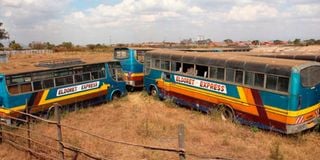Premium
Eldoret Express vs North Rift Shuttle: Ousted king vs new kid on the block

Eldoret Express buses are seen parked at the bus transport company's yard in Juja, Kiambu County, on August 6, 2020.
What you need to know:
- Eldoret Express buses now rotting away in a run-down yard in Juja after business went south more than a decade ago.
- But as Eldoret Express suffers, the story of North Rift Shuttle is totally different.
Once the king of the road in Western, Eldoret Express is now a pale shadow of its former self. The company’s Scania buses ruled the region in the 1990s and early 2000s, only to be pushed off the highway by the more convenient and comfortable 14-seater shuttles.
The buses are now rotting away in a run-down yard in Juja after business went south more than a decade ago. Former staff recall the good old days when the company dominated the western circuit and made huge profits.
Mr John Richu, a former conductor, says new companies offered travellers better services, which left Eldoret Express with an outdated business model that eventually led to its fall. He blames the owner for not taking his business seriously, adding that “customers must be well taken care of”.
“At the beginning, the owner ensured there were fair fares. But things changed the moment he started hiking fares haphazardly. Also, when he left management to his staff, many became arrogant to customers and that’s how the company lost it,” says Mr Richu.
Ms Margaret Muthoni, a mitumba trader at Eldoret West market, says the collapse of Eldoret Express affected her business.
“I relied on Eldoret Express in transporting my goods from Nairobi for years. Some of the conductors knew where to pick my bales from Eastleigh, so I didn’t have to travel. Now, I must hire a truck, which is expensive,” she says.
Mr Ezekiel Koech, a former clerk at the company’s Eldoret office, says about 60 per cent of staff were sent home when things went south.
“What happened to us is similar to what happened to workers of Uchumi, Nakumatt and Tuskys. Most of us suffered for a long time. I later got a job with a sacco plying the North Rift-Nairobi route,” he says.
Many say the company failed to embrace change as shuttles grabbed the market.
“Eldoret Express got it all wrong when it made it compulsory for the bus to be full for it to start the journey. Most customers are time-conscious. It should have adapted to market demands, just like Easy Coach did,” says Mr Raphael Kamau, who works at the Eldoret main terminus.
“The management slept on the job, killing the most vibrant transport firm in the country. Companies that adapted to new market trends are still doing well. Another vital issue is communication skills. Passengers prefer a bus company whose staff are welcoming; not arrogant, careless and unreliable,” he adds.

Passengers wait to board a matatu at North Rift Luxury Shuttle booking office in Eldoret town, Uasin Gishu County on May 10, 2021.
But as Eldoret Express suffers, the story of North Rift Shuttle is totally different. Its excellent customer care service has given it an edge over its competitors. It was started in 2004 after the investors were almost knocked-out of business following the collapse of Crossland Sacco.
“After realising that Crossland Sacco had no future, they withdrew their shares and bought five vehicles to started North Rift Shuttle,” says Mr John Karuga Karanja, the manager. The directors invited other interested investors.
“They took out loans from Equity Bank to increase their fleet of vehicles,” adds Mr Karuga, noting that any business requires a lot of financial and administrative discipline.
Although other businessmen are allowed to manage their vehicles under the company’s name, they do not qualify to be shareholders and cannot have more vehicles on the road than the four directors.
“The fact that we could easily access loans using our vehicles enabled members to purchase more and ride on our goodwill to expand,” says Mr Karuga.
Interested investors must have at least Sh2.8 million to hit the road. Out of this, between Sh1.6 million and Sh1.8 million is for buying the vehicle, while the remaining amount is for fittings. Each vehicle remits Sh500 per trip for operational costs.
“On average, each vehicle makes a net profit of Sh50,000 monthly, subject to fluctuating market trends, which is enough and sustain operations,” he says.
North Rift manages a fleet of about 120 vehicles and more than 400 staff. “Like any other business, it was not easy at the beginning as it needed a lot of sacrifice and commitment,” adds Mr Karuga, adding that discipline has been key to success.
“Although we have many members, decision making is centralised, which ensures there’s harmony, giving the company a conducive environment to thrive,” he says.
Mr Karuga says members are under instructions to sell their vehicles after a certain period to rejuvenate the fleet. The company had more than 100 vehicles by the end of 2004 as it took control of the Nairobi, Eldoret, Bungoma and Kitale routes.
“Drivers receive a minimum pay of Sh15,000, among other benefits,” says Mr Karuga, adding that the company has a strict policy against arbitrary hiking of fares, with drivers always under instruction to take good care of first-time travellers in certain routes. They often guide them and call to ensure they are arrived to their destinations safely.
This story is part of a series examining the crisis in Kenya's transport sector, in part due to the Covid-19 pandemic. Also read:





